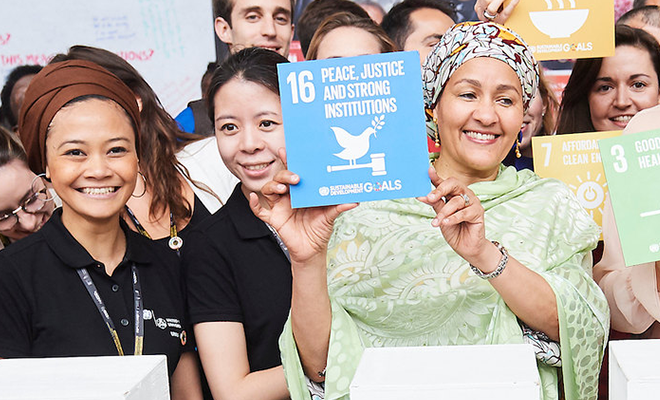The role of business in society is as contested as ever. The economic growth that business can contribute to can bring states together as it did after World War II under the European Union. However, it can also trigger conflict if the benefits are not distributed equitably, as we have seen in Myanmar, where rapid economic opening exacerbated economic and social divisions between ethnic groups, contributing to violence.
Responsible businesses or only “peacewashing” their activities?
Working in challenging environments across the developing world, firms can use either peace or conflict as a window to profit. On the plus side, this can mean companies changing their operational strategies to better support the United Nations Sustainable Development Goals, especially SDG16, or more engaged Corporate Social Responsibility action. On the negative side, firms can also use the same platforms to 'peacewash' their activities, arguing that their mere economic presence in conflict zones improves local communities when the reality leads to the opposite.
 New research on the role of business
New research on the role of business
Today we see a growing societal demand for businesses to be responsible actors. This has opened new potential paths for them to help build peace.
In our new edited volume, we bring together 16 global experts on business and peace to help us not only know the state of the art in business and peace research, but also to help us look forward to better understand the consequences of these initiatives on the global sustainable development agenda.
Conflicting trajectories; theory vs. practice
We find that the space for interested businesses to participate in peace has never been greater. Multinational firms, investment houses, small and medium-enterprises and other private sector actors have a wealth of tools at hand to help build peace, supported by a wide swath of multilateral organizations.
However, we also find that a frustratingly large proportion of these efforts remain stuck at the 'ceremonial commitments' stage: ventures that sound impressive on paper, but don't carry the depth or local knowledge needed to make a measurable peace impact.
In our book, we explore more deeply the ramifications of these conflicting trajectories upon theory and policy, in settings as diverse as El Salvador, Iraq, Colombia, Sri Lanka, and Norges Bank Investment Management (Norway's Oil fund).
Business as development actors
Further, we explore business-related issues for international relations practitioners, including management and policy frameworks in the context of the limitations for peace promotion by businesses in post-conflict zones.
To show how businesses function as development actors, this volume deciphers how different forms of corporate engagement in the pursuit of peace and development have different impacts and outcomes. In the process, we bridge the intersection of peace and sustainable development means for businesses in practice. We also explore how international organizations like the United Nations are helping frame business action and opportunity in conflict-affected areas.
Before businesses take a deeper role in the most complicated and risky elements of sustainable development, we need to be able to better explain what works, why it works, and what effective business efforts for peace and development mean for the multilateral institutional frameworks.
With this book, we aim to do just that.
More about the book
The contributors, from backgrounds including international relations, law, philosophy, development studies, political science, human rights and business (among others) decipher how different forms of corporate engagement in the pursuit of peace and development have different impacts and outcomes.
This book is a multi-disciplinary and cross-disciplinary exploration of business and peace, and intends to be a guiding reference point for future work on the topic. It has three sections that contribute to this aim: theoretical advances, business and peace in practice, and emerging peace policy. It is the first book to compile the state-of-the-field in one place and is an essential guide for students, researchers, policy-makers and practitioners.
Two overarching questions that drive this volume are: How can the private sector better deliver peace contributions in fragile, violent and/or conflict settings? And what are the deeper consequences of this agenda for businesses, governments, international institutions and not least local communities that are presumed to be the beneficiaries of such actions? It explores these questions through the study of relationships between political stability/fragility, ethical business activity and economic opportunity through research-supported good practices by business for sustainable peace.
Read more on the publisher's website
About the editors
Jason Miklian is Postdoctoral Fellow at the Centre for Development and the Environment, University of Oslo.
Rina M. Alluri is Senior scientist at the Department of Geography, University of Zurich
John E. Katsos is Associate Professor at the School of Business Administration, American University of Sharjah
Research on sustainable development
 Read more about our research on Governance for Sustainable Development and on the SDGs: Oslo SDG Initiative.
Read more about our research on Governance for Sustainable Development and on the SDGs: Oslo SDG Initiative.





